PUBH6006: Community Engagement Strategy for Ebola Outbreak in the DRC
VerifiedAdded on 2023/03/23
|8
|2365
|39
Report
AI Summary
This report outlines a community engagement and mobilization strategy for an emergency response plan addressing an Ebola virus outbreak in the Democratic Republic of Congo (DRC). It emphasizes the importance of community involvement through engagement, consultation, participation, organization, capacity building, action, and empowerment. The strategy advocates for a bottom-up approach to enhance resilience, decentralize responsibilities, and foster collaboration. The report highlights the need for community empowerment, skill training, improved sanitation, and water supply to reduce vulnerability. By prioritizing community engagement and a bottom-up approach, the strategy aims to improve public awareness, build local knowledge, and ensure the success of the Ebola virus health emergency preparedness and response efforts in the DRC.
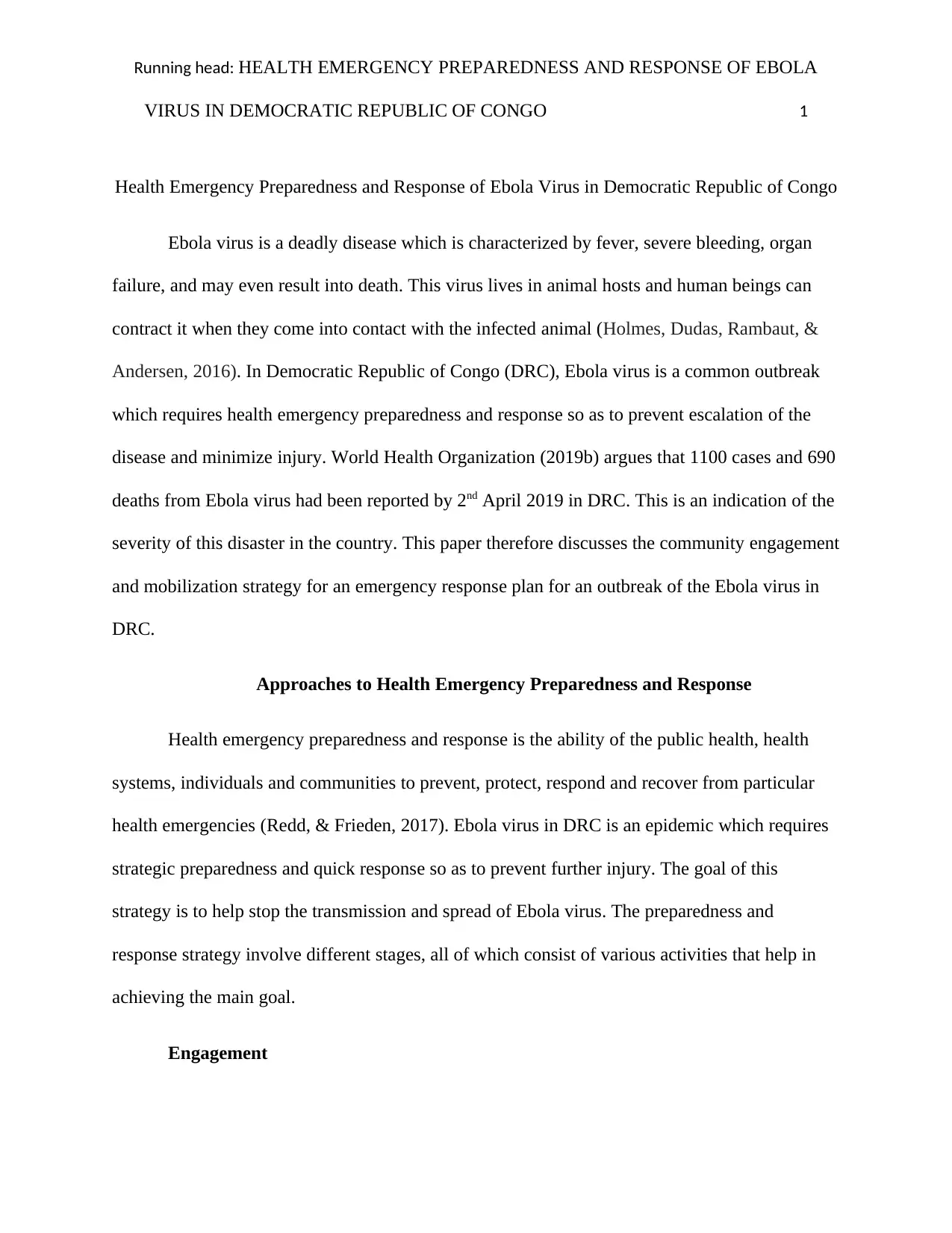
Running head: HEALTH EMERGENCY PREPAREDNESS AND RESPONSE OF EBOLA
VIRUS IN DEMOCRATIC REPUBLIC OF CONGO 1
Health Emergency Preparedness and Response of Ebola Virus in Democratic Republic of Congo
Ebola virus is a deadly disease which is characterized by fever, severe bleeding, organ
failure, and may even result into death. This virus lives in animal hosts and human beings can
contract it when they come into contact with the infected animal (Holmes, Dudas, Rambaut, &
Andersen, 2016). In Democratic Republic of Congo (DRC), Ebola virus is a common outbreak
which requires health emergency preparedness and response so as to prevent escalation of the
disease and minimize injury. World Health Organization (2019b) argues that 1100 cases and 690
deaths from Ebola virus had been reported by 2nd April 2019 in DRC. This is an indication of the
severity of this disaster in the country. This paper therefore discusses the community engagement
and mobilization strategy for an emergency response plan for an outbreak of the Ebola virus in
DRC.
Approaches to Health Emergency Preparedness and Response
Health emergency preparedness and response is the ability of the public health, health
systems, individuals and communities to prevent, protect, respond and recover from particular
health emergencies (Redd, & Frieden, 2017). Ebola virus in DRC is an epidemic which requires
strategic preparedness and quick response so as to prevent further injury. The goal of this
strategy is to help stop the transmission and spread of Ebola virus. The preparedness and
response strategy involve different stages, all of which consist of various activities that help in
achieving the main goal.
Engagement
VIRUS IN DEMOCRATIC REPUBLIC OF CONGO 1
Health Emergency Preparedness and Response of Ebola Virus in Democratic Republic of Congo
Ebola virus is a deadly disease which is characterized by fever, severe bleeding, organ
failure, and may even result into death. This virus lives in animal hosts and human beings can
contract it when they come into contact with the infected animal (Holmes, Dudas, Rambaut, &
Andersen, 2016). In Democratic Republic of Congo (DRC), Ebola virus is a common outbreak
which requires health emergency preparedness and response so as to prevent escalation of the
disease and minimize injury. World Health Organization (2019b) argues that 1100 cases and 690
deaths from Ebola virus had been reported by 2nd April 2019 in DRC. This is an indication of the
severity of this disaster in the country. This paper therefore discusses the community engagement
and mobilization strategy for an emergency response plan for an outbreak of the Ebola virus in
DRC.
Approaches to Health Emergency Preparedness and Response
Health emergency preparedness and response is the ability of the public health, health
systems, individuals and communities to prevent, protect, respond and recover from particular
health emergencies (Redd, & Frieden, 2017). Ebola virus in DRC is an epidemic which requires
strategic preparedness and quick response so as to prevent further injury. The goal of this
strategy is to help stop the transmission and spread of Ebola virus. The preparedness and
response strategy involve different stages, all of which consist of various activities that help in
achieving the main goal.
Engagement
Paraphrase This Document
Need a fresh take? Get an instant paraphrase of this document with our AI Paraphraser
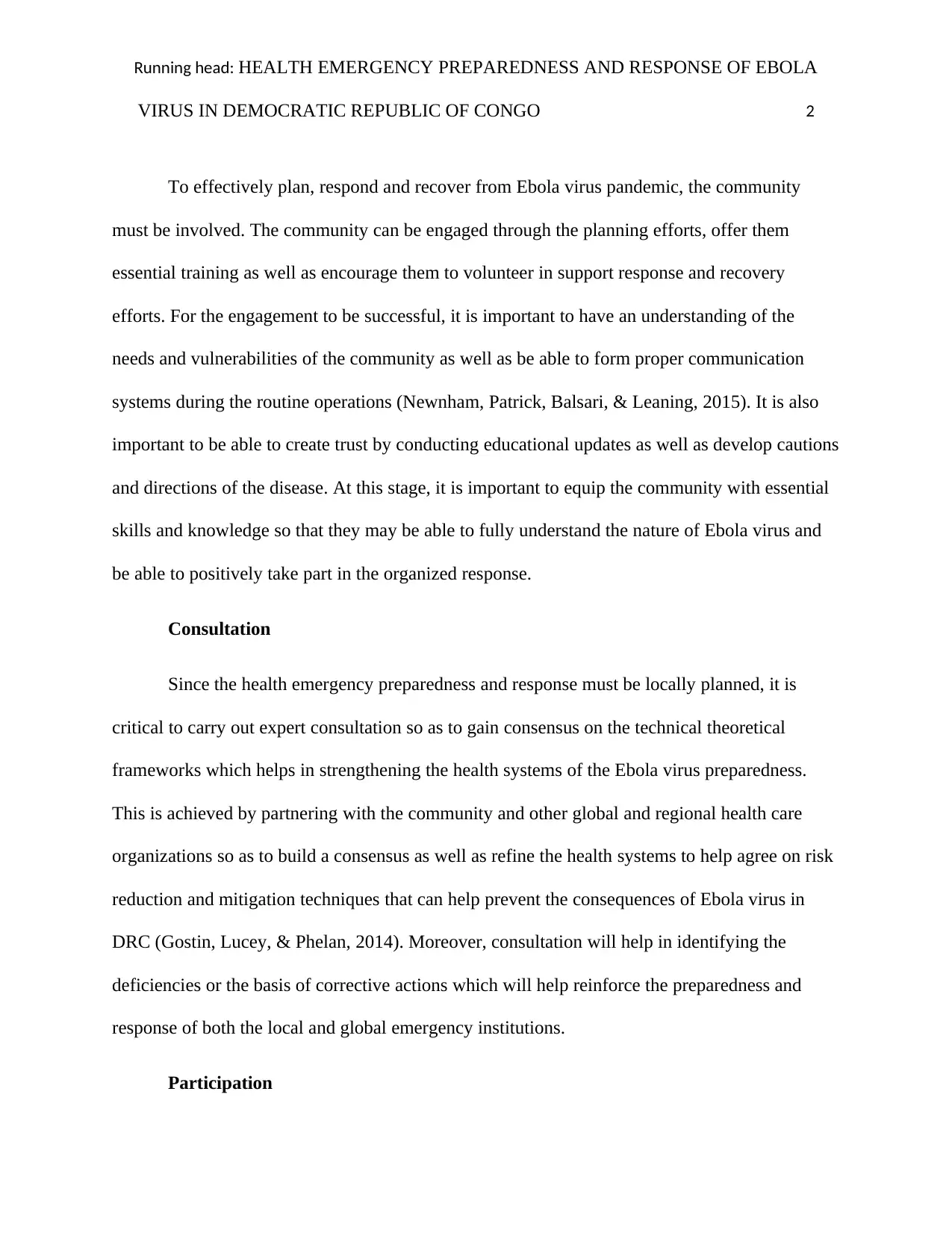
Running head: HEALTH EMERGENCY PREPAREDNESS AND RESPONSE OF EBOLA
VIRUS IN DEMOCRATIC REPUBLIC OF CONGO 2
To effectively plan, respond and recover from Ebola virus pandemic, the community
must be involved. The community can be engaged through the planning efforts, offer them
essential training as well as encourage them to volunteer in support response and recovery
efforts. For the engagement to be successful, it is important to have an understanding of the
needs and vulnerabilities of the community as well as be able to form proper communication
systems during the routine operations (Newnham, Patrick, Balsari, & Leaning, 2015). It is also
important to be able to create trust by conducting educational updates as well as develop cautions
and directions of the disease. At this stage, it is important to equip the community with essential
skills and knowledge so that they may be able to fully understand the nature of Ebola virus and
be able to positively take part in the organized response.
Consultation
Since the health emergency preparedness and response must be locally planned, it is
critical to carry out expert consultation so as to gain consensus on the technical theoretical
frameworks which helps in strengthening the health systems of the Ebola virus preparedness.
This is achieved by partnering with the community and other global and regional health care
organizations so as to build a consensus as well as refine the health systems to help agree on risk
reduction and mitigation techniques that can help prevent the consequences of Ebola virus in
DRC (Gostin, Lucey, & Phelan, 2014). Moreover, consultation will help in identifying the
deficiencies or the basis of corrective actions which will help reinforce the preparedness and
response of both the local and global emergency institutions.
Participation
VIRUS IN DEMOCRATIC REPUBLIC OF CONGO 2
To effectively plan, respond and recover from Ebola virus pandemic, the community
must be involved. The community can be engaged through the planning efforts, offer them
essential training as well as encourage them to volunteer in support response and recovery
efforts. For the engagement to be successful, it is important to have an understanding of the
needs and vulnerabilities of the community as well as be able to form proper communication
systems during the routine operations (Newnham, Patrick, Balsari, & Leaning, 2015). It is also
important to be able to create trust by conducting educational updates as well as develop cautions
and directions of the disease. At this stage, it is important to equip the community with essential
skills and knowledge so that they may be able to fully understand the nature of Ebola virus and
be able to positively take part in the organized response.
Consultation
Since the health emergency preparedness and response must be locally planned, it is
critical to carry out expert consultation so as to gain consensus on the technical theoretical
frameworks which helps in strengthening the health systems of the Ebola virus preparedness.
This is achieved by partnering with the community and other global and regional health care
organizations so as to build a consensus as well as refine the health systems to help agree on risk
reduction and mitigation techniques that can help prevent the consequences of Ebola virus in
DRC (Gostin, Lucey, & Phelan, 2014). Moreover, consultation will help in identifying the
deficiencies or the basis of corrective actions which will help reinforce the preparedness and
response of both the local and global emergency institutions.
Participation
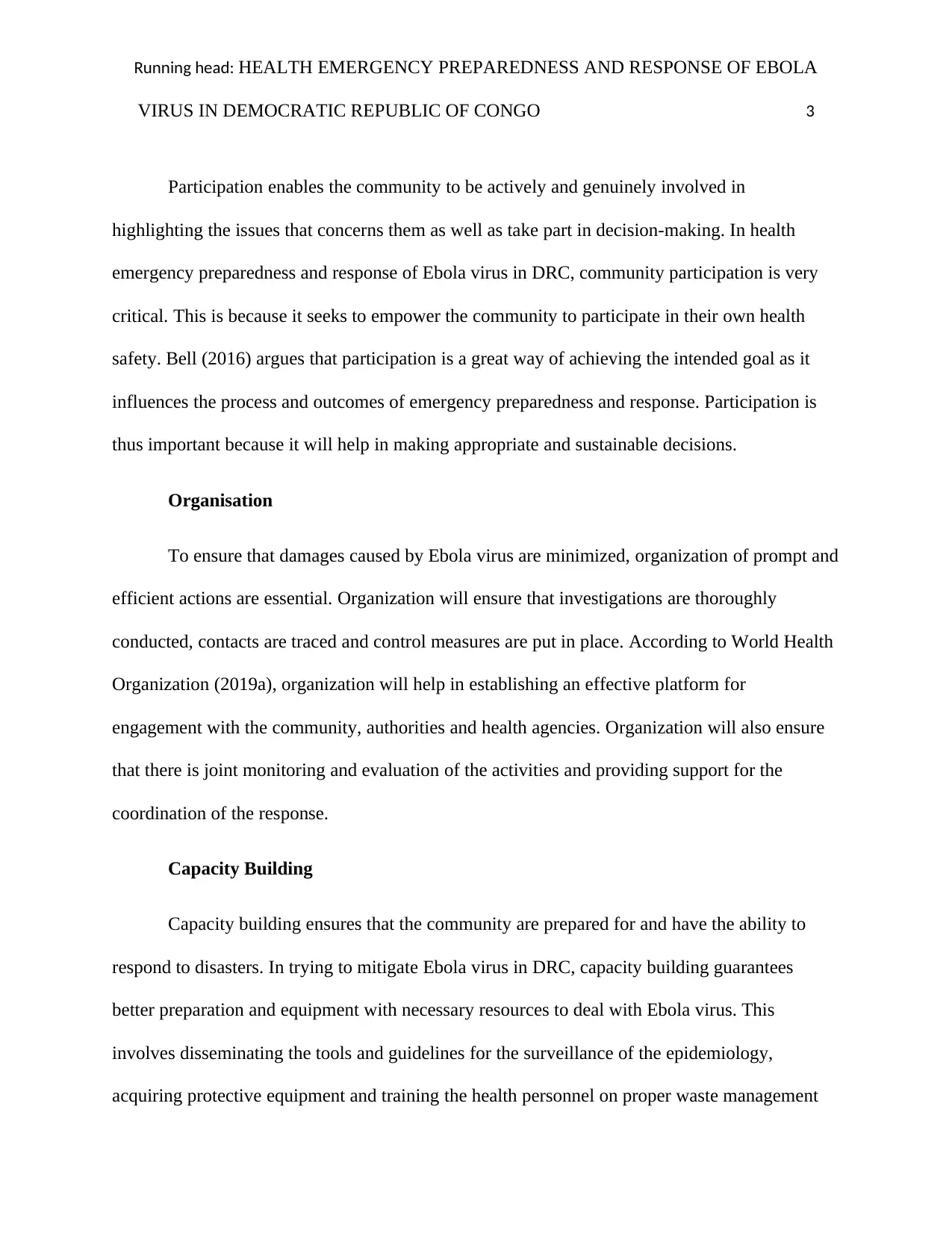
Running head: HEALTH EMERGENCY PREPAREDNESS AND RESPONSE OF EBOLA
VIRUS IN DEMOCRATIC REPUBLIC OF CONGO 3
Participation enables the community to be actively and genuinely involved in
highlighting the issues that concerns them as well as take part in decision-making. In health
emergency preparedness and response of Ebola virus in DRC, community participation is very
critical. This is because it seeks to empower the community to participate in their own health
safety. Bell (2016) argues that participation is a great way of achieving the intended goal as it
influences the process and outcomes of emergency preparedness and response. Participation is
thus important because it will help in making appropriate and sustainable decisions.
Organisation
To ensure that damages caused by Ebola virus are minimized, organization of prompt and
efficient actions are essential. Organization will ensure that investigations are thoroughly
conducted, contacts are traced and control measures are put in place. According to World Health
Organization (2019a), organization will help in establishing an effective platform for
engagement with the community, authorities and health agencies. Organization will also ensure
that there is joint monitoring and evaluation of the activities and providing support for the
coordination of the response.
Capacity Building
Capacity building ensures that the community are prepared for and have the ability to
respond to disasters. In trying to mitigate Ebola virus in DRC, capacity building guarantees
better preparation and equipment with necessary resources to deal with Ebola virus. This
involves disseminating the tools and guidelines for the surveillance of the epidemiology,
acquiring protective equipment and training the health personnel on proper waste management
VIRUS IN DEMOCRATIC REPUBLIC OF CONGO 3
Participation enables the community to be actively and genuinely involved in
highlighting the issues that concerns them as well as take part in decision-making. In health
emergency preparedness and response of Ebola virus in DRC, community participation is very
critical. This is because it seeks to empower the community to participate in their own health
safety. Bell (2016) argues that participation is a great way of achieving the intended goal as it
influences the process and outcomes of emergency preparedness and response. Participation is
thus important because it will help in making appropriate and sustainable decisions.
Organisation
To ensure that damages caused by Ebola virus are minimized, organization of prompt and
efficient actions are essential. Organization will ensure that investigations are thoroughly
conducted, contacts are traced and control measures are put in place. According to World Health
Organization (2019a), organization will help in establishing an effective platform for
engagement with the community, authorities and health agencies. Organization will also ensure
that there is joint monitoring and evaluation of the activities and providing support for the
coordination of the response.
Capacity Building
Capacity building ensures that the community are prepared for and have the ability to
respond to disasters. In trying to mitigate Ebola virus in DRC, capacity building guarantees
better preparation and equipment with necessary resources to deal with Ebola virus. This
involves disseminating the tools and guidelines for the surveillance of the epidemiology,
acquiring protective equipment and training the health personnel on proper waste management
⊘ This is a preview!⊘
Do you want full access?
Subscribe today to unlock all pages.

Trusted by 1+ million students worldwide
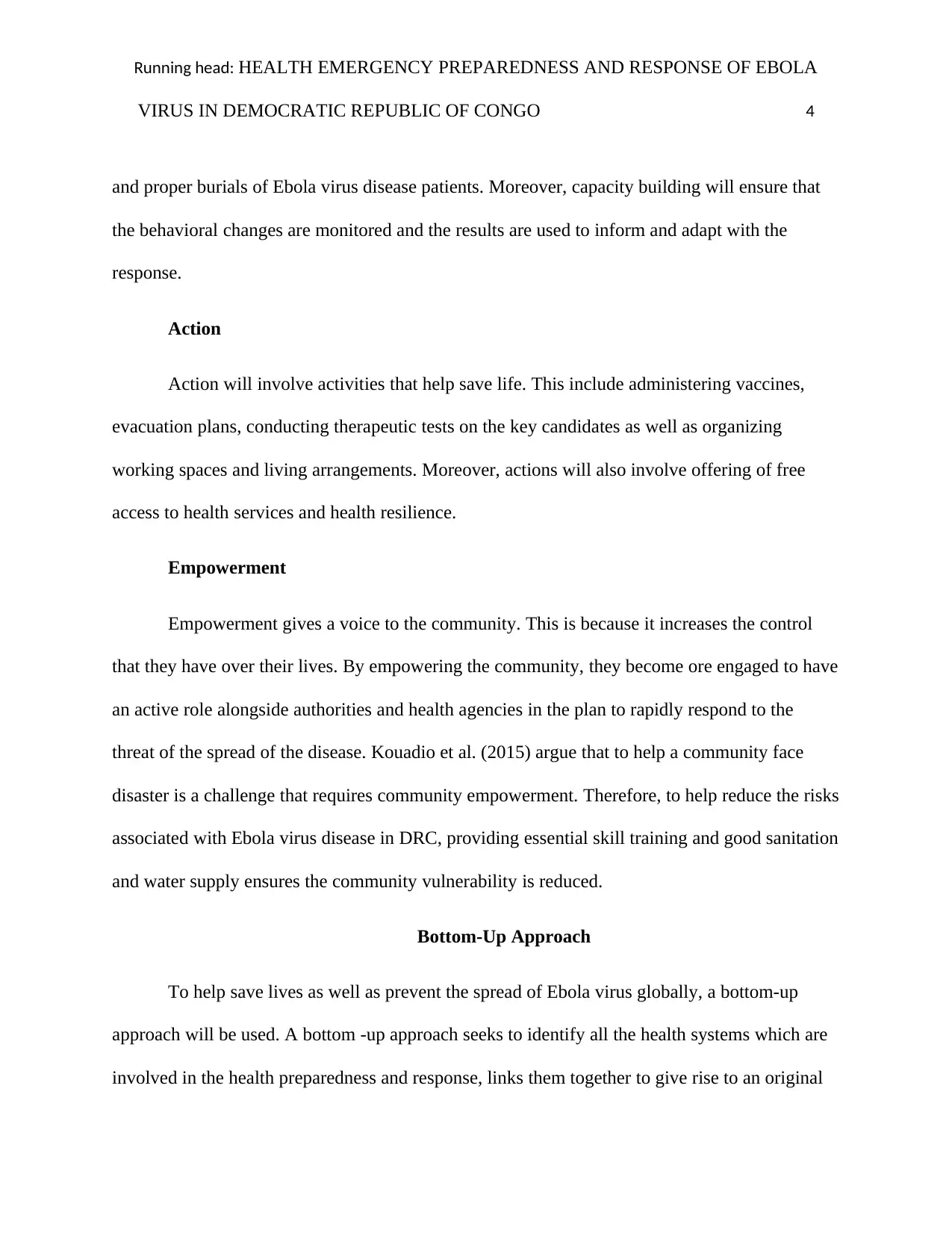
Running head: HEALTH EMERGENCY PREPAREDNESS AND RESPONSE OF EBOLA
VIRUS IN DEMOCRATIC REPUBLIC OF CONGO 4
and proper burials of Ebola virus disease patients. Moreover, capacity building will ensure that
the behavioral changes are monitored and the results are used to inform and adapt with the
response.
Action
Action will involve activities that help save life. This include administering vaccines,
evacuation plans, conducting therapeutic tests on the key candidates as well as organizing
working spaces and living arrangements. Moreover, actions will also involve offering of free
access to health services and health resilience.
Empowerment
Empowerment gives a voice to the community. This is because it increases the control
that they have over their lives. By empowering the community, they become ore engaged to have
an active role alongside authorities and health agencies in the plan to rapidly respond to the
threat of the spread of the disease. Kouadio et al. (2015) argue that to help a community face
disaster is a challenge that requires community empowerment. Therefore, to help reduce the risks
associated with Ebola virus disease in DRC, providing essential skill training and good sanitation
and water supply ensures the community vulnerability is reduced.
Bottom-Up Approach
To help save lives as well as prevent the spread of Ebola virus globally, a bottom-up
approach will be used. A bottom -up approach seeks to identify all the health systems which are
involved in the health preparedness and response, links them together to give rise to an original
VIRUS IN DEMOCRATIC REPUBLIC OF CONGO 4
and proper burials of Ebola virus disease patients. Moreover, capacity building will ensure that
the behavioral changes are monitored and the results are used to inform and adapt with the
response.
Action
Action will involve activities that help save life. This include administering vaccines,
evacuation plans, conducting therapeutic tests on the key candidates as well as organizing
working spaces and living arrangements. Moreover, actions will also involve offering of free
access to health services and health resilience.
Empowerment
Empowerment gives a voice to the community. This is because it increases the control
that they have over their lives. By empowering the community, they become ore engaged to have
an active role alongside authorities and health agencies in the plan to rapidly respond to the
threat of the spread of the disease. Kouadio et al. (2015) argue that to help a community face
disaster is a challenge that requires community empowerment. Therefore, to help reduce the risks
associated with Ebola virus disease in DRC, providing essential skill training and good sanitation
and water supply ensures the community vulnerability is reduced.
Bottom-Up Approach
To help save lives as well as prevent the spread of Ebola virus globally, a bottom-up
approach will be used. A bottom -up approach seeks to identify all the health systems which are
involved in the health preparedness and response, links them together to give rise to an original
Paraphrase This Document
Need a fresh take? Get an instant paraphrase of this document with our AI Paraphraser
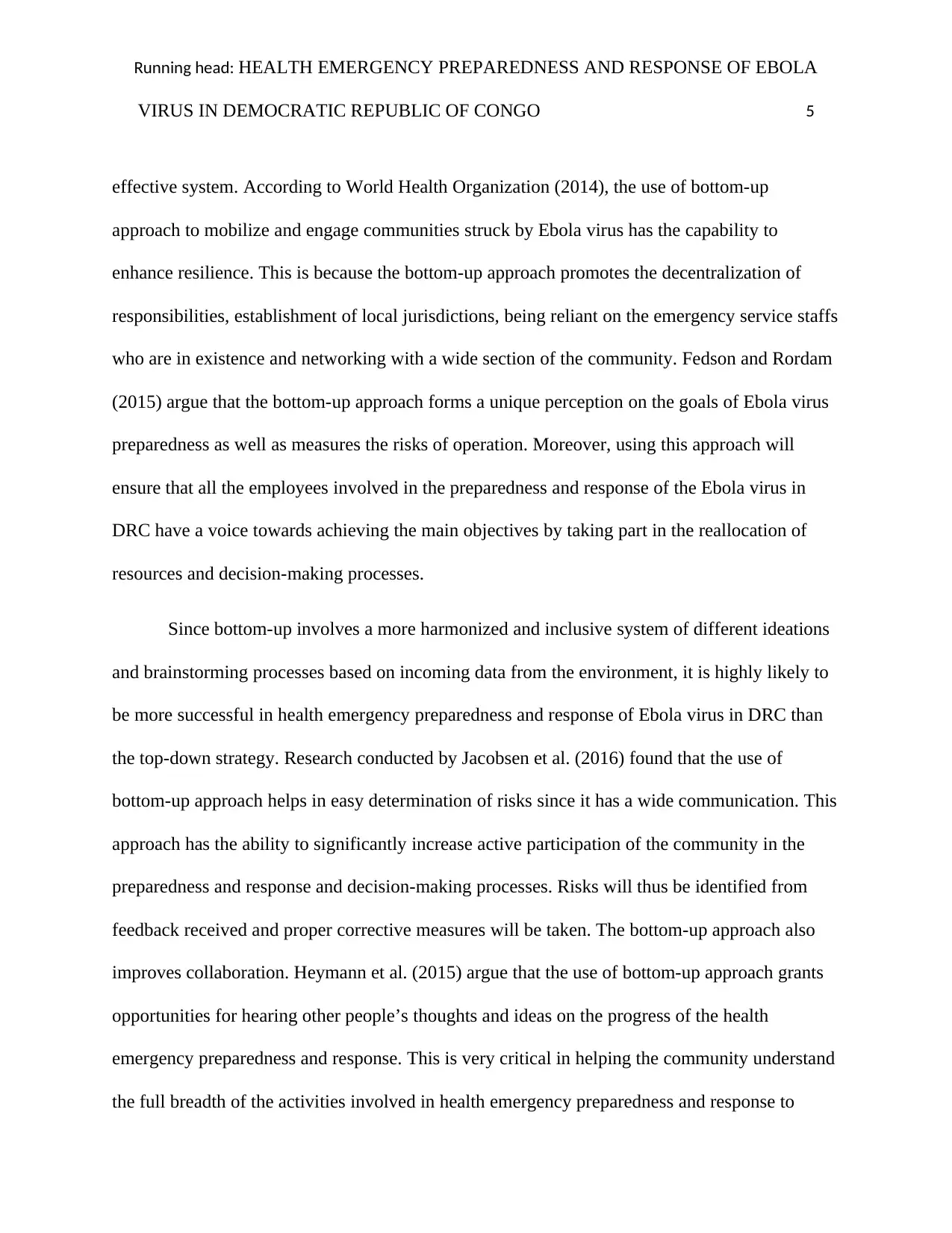
Running head: HEALTH EMERGENCY PREPAREDNESS AND RESPONSE OF EBOLA
VIRUS IN DEMOCRATIC REPUBLIC OF CONGO 5
effective system. According to World Health Organization (2014), the use of bottom-up
approach to mobilize and engage communities struck by Ebola virus has the capability to
enhance resilience. This is because the bottom-up approach promotes the decentralization of
responsibilities, establishment of local jurisdictions, being reliant on the emergency service staffs
who are in existence and networking with a wide section of the community. Fedson and Rordam
(2015) argue that the bottom-up approach forms a unique perception on the goals of Ebola virus
preparedness as well as measures the risks of operation. Moreover, using this approach will
ensure that all the employees involved in the preparedness and response of the Ebola virus in
DRC have a voice towards achieving the main objectives by taking part in the reallocation of
resources and decision-making processes.
Since bottom-up involves a more harmonized and inclusive system of different ideations
and brainstorming processes based on incoming data from the environment, it is highly likely to
be more successful in health emergency preparedness and response of Ebola virus in DRC than
the top-down strategy. Research conducted by Jacobsen et al. (2016) found that the use of
bottom-up approach helps in easy determination of risks since it has a wide communication. This
approach has the ability to significantly increase active participation of the community in the
preparedness and response and decision-making processes. Risks will thus be identified from
feedback received and proper corrective measures will be taken. The bottom-up approach also
improves collaboration. Heymann et al. (2015) argue that the use of bottom-up approach grants
opportunities for hearing other people’s thoughts and ideas on the progress of the health
emergency preparedness and response. This is very critical in helping the community understand
the full breadth of the activities involved in health emergency preparedness and response to
VIRUS IN DEMOCRATIC REPUBLIC OF CONGO 5
effective system. According to World Health Organization (2014), the use of bottom-up
approach to mobilize and engage communities struck by Ebola virus has the capability to
enhance resilience. This is because the bottom-up approach promotes the decentralization of
responsibilities, establishment of local jurisdictions, being reliant on the emergency service staffs
who are in existence and networking with a wide section of the community. Fedson and Rordam
(2015) argue that the bottom-up approach forms a unique perception on the goals of Ebola virus
preparedness as well as measures the risks of operation. Moreover, using this approach will
ensure that all the employees involved in the preparedness and response of the Ebola virus in
DRC have a voice towards achieving the main objectives by taking part in the reallocation of
resources and decision-making processes.
Since bottom-up involves a more harmonized and inclusive system of different ideations
and brainstorming processes based on incoming data from the environment, it is highly likely to
be more successful in health emergency preparedness and response of Ebola virus in DRC than
the top-down strategy. Research conducted by Jacobsen et al. (2016) found that the use of
bottom-up approach helps in easy determination of risks since it has a wide communication. This
approach has the ability to significantly increase active participation of the community in the
preparedness and response and decision-making processes. Risks will thus be identified from
feedback received and proper corrective measures will be taken. The bottom-up approach also
improves collaboration. Heymann et al. (2015) argue that the use of bottom-up approach grants
opportunities for hearing other people’s thoughts and ideas on the progress of the health
emergency preparedness and response. This is very critical in helping the community understand
the full breadth of the activities involved in health emergency preparedness and response to
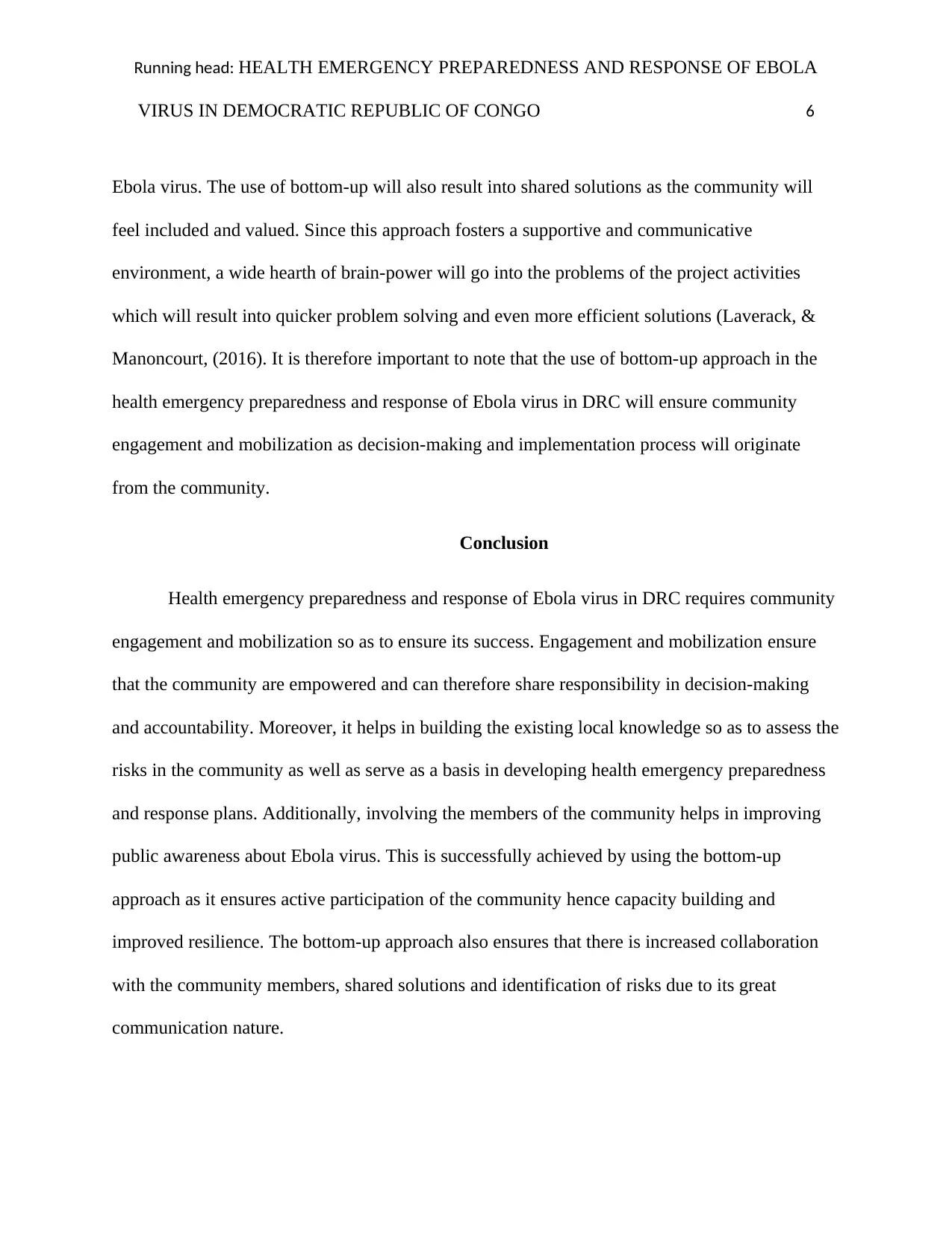
Running head: HEALTH EMERGENCY PREPAREDNESS AND RESPONSE OF EBOLA
VIRUS IN DEMOCRATIC REPUBLIC OF CONGO 6
Ebola virus. The use of bottom-up will also result into shared solutions as the community will
feel included and valued. Since this approach fosters a supportive and communicative
environment, a wide hearth of brain-power will go into the problems of the project activities
which will result into quicker problem solving and even more efficient solutions (Laverack, &
Manoncourt, (2016). It is therefore important to note that the use of bottom-up approach in the
health emergency preparedness and response of Ebola virus in DRC will ensure community
engagement and mobilization as decision-making and implementation process will originate
from the community.
Conclusion
Health emergency preparedness and response of Ebola virus in DRC requires community
engagement and mobilization so as to ensure its success. Engagement and mobilization ensure
that the community are empowered and can therefore share responsibility in decision-making
and accountability. Moreover, it helps in building the existing local knowledge so as to assess the
risks in the community as well as serve as a basis in developing health emergency preparedness
and response plans. Additionally, involving the members of the community helps in improving
public awareness about Ebola virus. This is successfully achieved by using the bottom-up
approach as it ensures active participation of the community hence capacity building and
improved resilience. The bottom-up approach also ensures that there is increased collaboration
with the community members, shared solutions and identification of risks due to its great
communication nature.
VIRUS IN DEMOCRATIC REPUBLIC OF CONGO 6
Ebola virus. The use of bottom-up will also result into shared solutions as the community will
feel included and valued. Since this approach fosters a supportive and communicative
environment, a wide hearth of brain-power will go into the problems of the project activities
which will result into quicker problem solving and even more efficient solutions (Laverack, &
Manoncourt, (2016). It is therefore important to note that the use of bottom-up approach in the
health emergency preparedness and response of Ebola virus in DRC will ensure community
engagement and mobilization as decision-making and implementation process will originate
from the community.
Conclusion
Health emergency preparedness and response of Ebola virus in DRC requires community
engagement and mobilization so as to ensure its success. Engagement and mobilization ensure
that the community are empowered and can therefore share responsibility in decision-making
and accountability. Moreover, it helps in building the existing local knowledge so as to assess the
risks in the community as well as serve as a basis in developing health emergency preparedness
and response plans. Additionally, involving the members of the community helps in improving
public awareness about Ebola virus. This is successfully achieved by using the bottom-up
approach as it ensures active participation of the community hence capacity building and
improved resilience. The bottom-up approach also ensures that there is increased collaboration
with the community members, shared solutions and identification of risks due to its great
communication nature.
⊘ This is a preview!⊘
Do you want full access?
Subscribe today to unlock all pages.

Trusted by 1+ million students worldwide
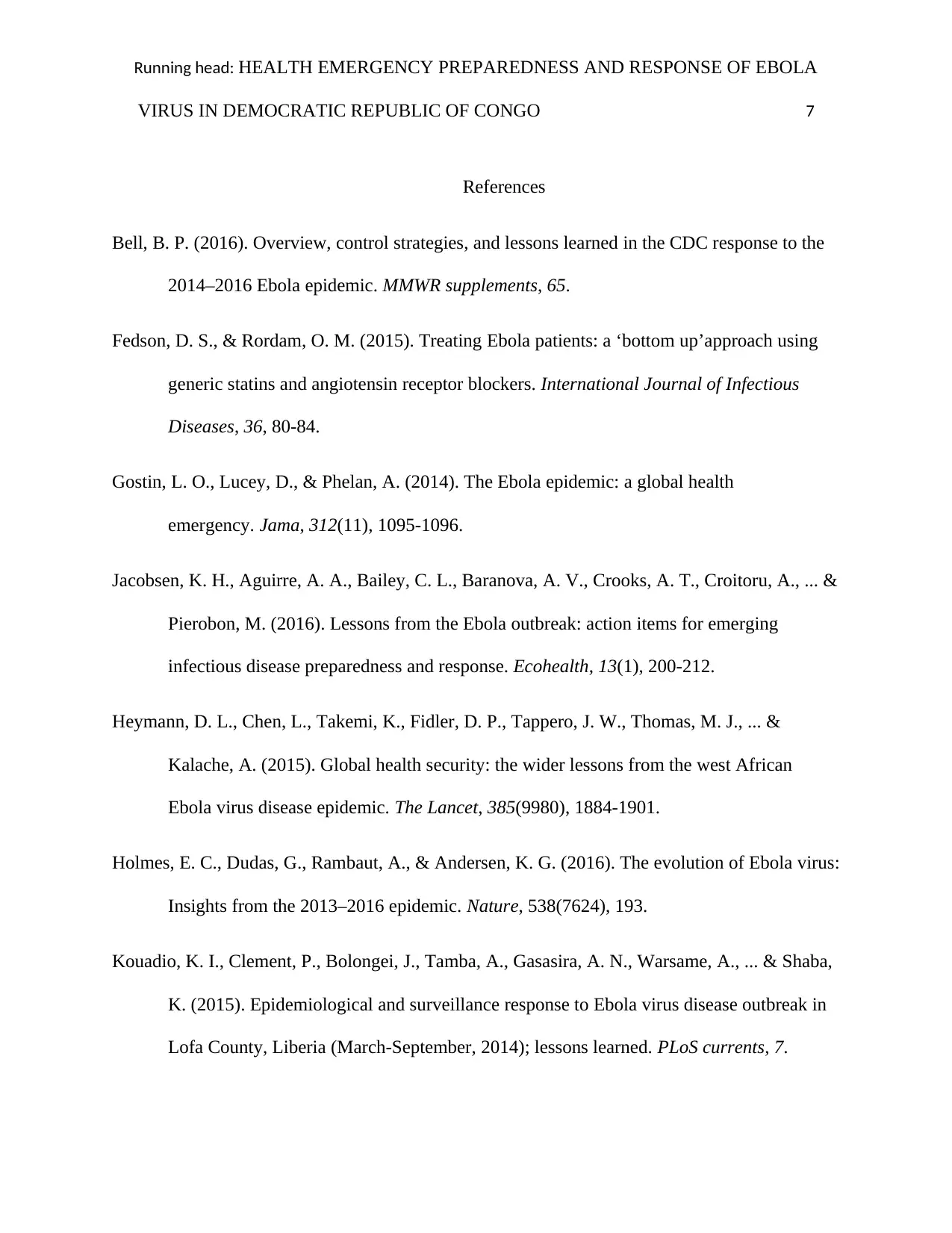
Running head: HEALTH EMERGENCY PREPAREDNESS AND RESPONSE OF EBOLA
VIRUS IN DEMOCRATIC REPUBLIC OF CONGO 7
References
Bell, B. P. (2016). Overview, control strategies, and lessons learned in the CDC response to the
2014–2016 Ebola epidemic. MMWR supplements, 65.
Fedson, D. S., & Rordam, O. M. (2015). Treating Ebola patients: a ‘bottom up’approach using
generic statins and angiotensin receptor blockers. International Journal of Infectious
Diseases, 36, 80-84.
Gostin, L. O., Lucey, D., & Phelan, A. (2014). The Ebola epidemic: a global health
emergency. Jama, 312(11), 1095-1096.
Jacobsen, K. H., Aguirre, A. A., Bailey, C. L., Baranova, A. V., Crooks, A. T., Croitoru, A., ... &
Pierobon, M. (2016). Lessons from the Ebola outbreak: action items for emerging
infectious disease preparedness and response. Ecohealth, 13(1), 200-212.
Heymann, D. L., Chen, L., Takemi, K., Fidler, D. P., Tappero, J. W., Thomas, M. J., ... &
Kalache, A. (2015). Global health security: the wider lessons from the west African
Ebola virus disease epidemic. The Lancet, 385(9980), 1884-1901.
Holmes, E. C., Dudas, G., Rambaut, A., & Andersen, K. G. (2016). The evolution of Ebola virus:
Insights from the 2013–2016 epidemic. Nature, 538(7624), 193.
Kouadio, K. I., Clement, P., Bolongei, J., Tamba, A., Gasasira, A. N., Warsame, A., ... & Shaba,
K. (2015). Epidemiological and surveillance response to Ebola virus disease outbreak in
Lofa County, Liberia (March-September, 2014); lessons learned. PLoS currents, 7.
VIRUS IN DEMOCRATIC REPUBLIC OF CONGO 7
References
Bell, B. P. (2016). Overview, control strategies, and lessons learned in the CDC response to the
2014–2016 Ebola epidemic. MMWR supplements, 65.
Fedson, D. S., & Rordam, O. M. (2015). Treating Ebola patients: a ‘bottom up’approach using
generic statins and angiotensin receptor blockers. International Journal of Infectious
Diseases, 36, 80-84.
Gostin, L. O., Lucey, D., & Phelan, A. (2014). The Ebola epidemic: a global health
emergency. Jama, 312(11), 1095-1096.
Jacobsen, K. H., Aguirre, A. A., Bailey, C. L., Baranova, A. V., Crooks, A. T., Croitoru, A., ... &
Pierobon, M. (2016). Lessons from the Ebola outbreak: action items for emerging
infectious disease preparedness and response. Ecohealth, 13(1), 200-212.
Heymann, D. L., Chen, L., Takemi, K., Fidler, D. P., Tappero, J. W., Thomas, M. J., ... &
Kalache, A. (2015). Global health security: the wider lessons from the west African
Ebola virus disease epidemic. The Lancet, 385(9980), 1884-1901.
Holmes, E. C., Dudas, G., Rambaut, A., & Andersen, K. G. (2016). The evolution of Ebola virus:
Insights from the 2013–2016 epidemic. Nature, 538(7624), 193.
Kouadio, K. I., Clement, P., Bolongei, J., Tamba, A., Gasasira, A. N., Warsame, A., ... & Shaba,
K. (2015). Epidemiological and surveillance response to Ebola virus disease outbreak in
Lofa County, Liberia (March-September, 2014); lessons learned. PLoS currents, 7.
Paraphrase This Document
Need a fresh take? Get an instant paraphrase of this document with our AI Paraphraser
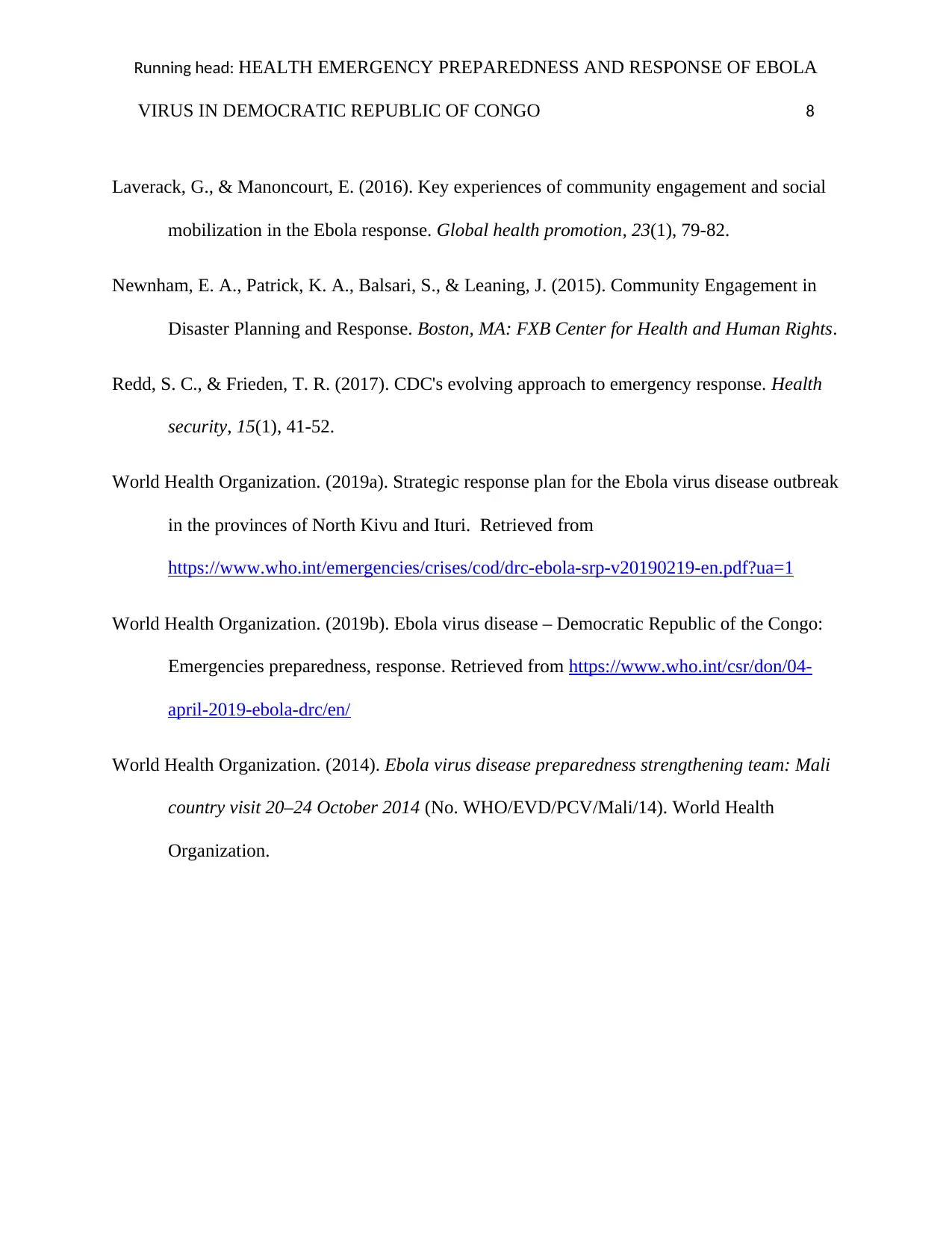
Running head: HEALTH EMERGENCY PREPAREDNESS AND RESPONSE OF EBOLA
VIRUS IN DEMOCRATIC REPUBLIC OF CONGO 8
Laverack, G., & Manoncourt, E. (2016). Key experiences of community engagement and social
mobilization in the Ebola response. Global health promotion, 23(1), 79-82.
Newnham, E. A., Patrick, K. A., Balsari, S., & Leaning, J. (2015). Community Engagement in
Disaster Planning and Response. Boston, MA: FXB Center for Health and Human Rights.
Redd, S. C., & Frieden, T. R. (2017). CDC's evolving approach to emergency response. Health
security, 15(1), 41-52.
World Health Organization. (2019a). Strategic response plan for the Ebola virus disease outbreak
in the provinces of North Kivu and Ituri. Retrieved from
https://www.who.int/emergencies/crises/cod/drc-ebola-srp-v20190219-en.pdf?ua=1
World Health Organization. (2019b). Ebola virus disease – Democratic Republic of the Congo:
Emergencies preparedness, response. Retrieved from https://www.who.int/csr/don/04-
april-2019-ebola-drc/en/
World Health Organization. (2014). Ebola virus disease preparedness strengthening team: Mali
country visit 20–24 October 2014 (No. WHO/EVD/PCV/Mali/14). World Health
Organization.
VIRUS IN DEMOCRATIC REPUBLIC OF CONGO 8
Laverack, G., & Manoncourt, E. (2016). Key experiences of community engagement and social
mobilization in the Ebola response. Global health promotion, 23(1), 79-82.
Newnham, E. A., Patrick, K. A., Balsari, S., & Leaning, J. (2015). Community Engagement in
Disaster Planning and Response. Boston, MA: FXB Center for Health and Human Rights.
Redd, S. C., & Frieden, T. R. (2017). CDC's evolving approach to emergency response. Health
security, 15(1), 41-52.
World Health Organization. (2019a). Strategic response plan for the Ebola virus disease outbreak
in the provinces of North Kivu and Ituri. Retrieved from
https://www.who.int/emergencies/crises/cod/drc-ebola-srp-v20190219-en.pdf?ua=1
World Health Organization. (2019b). Ebola virus disease – Democratic Republic of the Congo:
Emergencies preparedness, response. Retrieved from https://www.who.int/csr/don/04-
april-2019-ebola-drc/en/
World Health Organization. (2014). Ebola virus disease preparedness strengthening team: Mali
country visit 20–24 October 2014 (No. WHO/EVD/PCV/Mali/14). World Health
Organization.
1 out of 8
Related Documents
Your All-in-One AI-Powered Toolkit for Academic Success.
+13062052269
info@desklib.com
Available 24*7 on WhatsApp / Email
![[object Object]](/_next/static/media/star-bottom.7253800d.svg)
Unlock your academic potential
Copyright © 2020–2026 A2Z Services. All Rights Reserved. Developed and managed by ZUCOL.




